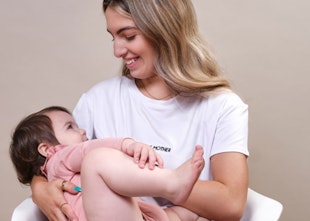FFHQ Pregnancy Expert and Midwife Avril Flynn reveals how your newborn adapts to life outside the womb.
Your baby spends the best part of 10 months neatly nestled in the womb. During that time, they grow and develop into your beautiful little human, ready to be the best thing that ever happened to you.
The mother’s amazing body provides the growing baby with everything that it needs - every nutrient, every element, every single cell. Until a baby is born, he or she will have a constant stream of food, of oxygen and have their waste dealt with by their placenta, and ultimately their mothers’ body. It really is incredible.
What is even more incredible, however, is that in the seconds after your little person enters into the world (and in the minutes, and hours just after) they amazingly adapt to life outside of their mother.
When I was training to be a midwife, learning how these perfect little creatures made so many changes in such a short time astonished me. I wanted to share a few of these with you too, so you could be as equally blown away.
When a baby is born one of the first, and most important changes that occur is that they breathe for themselves. While inside the mother, the lungs are idle, filled with fluid, and uninflated.
The entire circulatory system flows differently as the oxygen baby needs come through the mother, into the placenta and into the baby through the umbilical cord, and the excreted carbon dioxide in the opposite direction.

When the baby is born, the air on their face stimulates a gasp or cry. Those first few precious cries while baby sucks in air, causes the vessels in the heart (that have bypassed the lungs up till now) to start to shut.
The air into the lungs forces the fluid out, and the baby begins within a few seconds to support their own oxygen needs. It is an amazing thing to witness and never once in my career did it ever seem short of miraculous.
Your baby is now breathing on their own. Within a short while, they will also, for the first time, begin to feed. Having never felt hunger before, it must seem like such a strange sensation for them! Your baby must also begin to regulate their own temperature.
This is why skin-to-skin is such an amazing thing to do after they are born, as it helps to ease this transition from little beings whose every need is met by their mother, to having to look after some of their own needs.
Babies are born with a supply of something that only exists at birth, something called brown fat. This special fat is burned off and helps baby’s bodies to learn to control their own temperature. They still, however, need to be kept warm by us though!
The mother’s amazing body provides the growing baby with everything that it needs - every nutrient, every element, every single cell.
Alongside the new baby now breathing, feeding and controlling its temperature, its body is learning to do all of the things that we as adults take for granted in our biology. Their stomachs are digesting and absorbing the food they are getting through their own mouths for the first time.
Their intestines and bowels begin to function, and they will have their first bowel motion- a black tarry substance called meconium. Their kidneys are cleaning their blood and producing urine for the first time. Making sure your baby has passed urine and had a dirty nappy is one of the things your midwife will check repeatedly after your little one has been born.
All in all, it is mind-blowing how good your baby has to be at all of these things the instant that they are born. For some babies, they need some extra help to sucessfully adapt to life- it's why we are so lucky to have neonatologist and special nurses who can help them. But most do incredibly well, all on their own.







